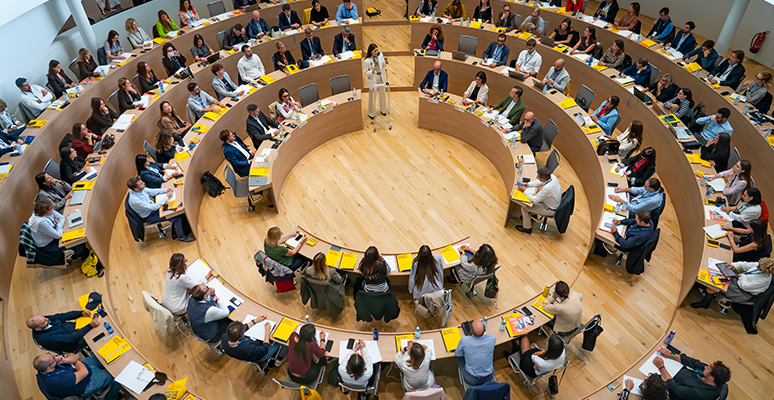
- Start date
- Duration
- Format
- Language
- 1 Dec 2025
- 3 days
- Class
- English
A journey through the digital revolution to learn how to capitalize on these enhancing technologies to gain competitive advantage in existing and new markets.
Milan is positioning itself as Italy’s capital of the space economy, thanks to the collaboration between two research centers dedicated to the field: the Space Economy Evolution Lab (SEE Lab) at SDA Bocconi School of Management and the Osservatorio Space Economy (OSE) at Politecnico di Milano.
“After all, Milan is one of the iconic cities of European football and the only one where two teams like AC Milan and Inter share the same stadium,” said Bocconi Rector Francesco Billari, using a football metaphor to describe the collaboration during an event on Innovation and Transformation of the Space Ecosystem, held on Monday, January 27, at the Leonardo da Vinci Museum of Science and Technology.
Politecnico Rector Donatella Sciuto emphasized how cooperation between the two institutions, not only in the space sector, can be particularly fruitful thanks to their complementary expertise.
In response to questions from Michèle Lavagna, Scientific Director of the Osservatorio Space Economy, Franco Ongaro, former Chief Space Business Officer at Leonardo, highlighted the public roots of the new space economy, which today is driven by private sector demand more than ever before. “The American billionaires leading the sector today,” he noted, “are building on 60 years of major public investments. In Italy, the PNRR, by spending large amounts quickly, is multiplying production and launch opportunities for three years, but we need to ask ourselves what happens next.”
“In the space economy, the initial intervention is almost always G2G; then governments and space agencies invest, creating the conditions to shift to B2B. Public investments are, in any case, at the origin of the space economy,” summarized Simonetta Di Pippo, Director of SEE Lab.
The event featured two panel discussions on four key trends in the space industry—servitization, miniaturization, modularization, and digitalization—with contributions from both space and non-space companies, including Aidro, Apogeo Space, CERVED Group, Elemaster, Thales Alenia Space Italia, and TXT e-solutions.
The discussions underscored the need for cross-sector fertilization, enabling earth-based companies to leverage opportunities from the space sector and vice versa.
SDA Bocconi School of Management

A journey through the digital revolution to learn how to capitalize on these enhancing technologies to gain competitive advantage in existing and new markets.

Fornire gli strumenti per (ri)disegnare la roadmap di adozione e sviluppo dell’AI in azienda bilanciando strategia, elementi tecnologici, organizzativi e di contesto.

The course aims to investigate how a more digital approach in supply chain processes can improve the level of service provided

